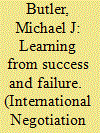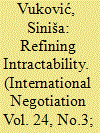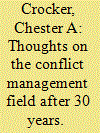|
|
|
Sort Order |
|
|
|
Items / Page
|
|
|
|
|
|
|
| Srl | Item |
| 1 |
ID:
167455


|
|
|
|
|
| Summary/Abstract |
The various contributions to this special issue reveal three overarching insights with respect to negotiation and mediation in the hard(est) cases: one, the discrepancy between securing negotiated or mediated agreements and actual solutions; two, the conditioning effects of structural and contextual considerations on the bargaining process; and three, the divergent ends to which negotiation and mediation can be (and are) directed. Ultimately, the preceding analyses suggest that, when it comes to the hard(est) cases, negotiation and mediation are best thought of as tools within a larger toolkit, which have a markedly better chance of succeeding when they are employed in an environment amenable to them. On their own, negotiation and mediation cannot be effective in cultivating ripeness in such cases. Rather, the challenge at hand is to employ other means to transform the context enveloping the bargaining environment in ways that are conducive to negotiated and mediated solutions.
|
|
|
|
|
|
|
|
|
|
|
|
|
|
|
|
| 2 |
ID:
167449


|
|
|
|
|
| Summary/Abstract |
In seeking a fuller understanding of the provision and effectiveness of negotiation and mediation, salient lessons can be gleaned from instances in which these processes seem unlikely to succeed or unlikely to be tried at all. Contributions to this special issue of International Negotiation purposefully avoid mining examples of success stories for correlates. The contributors have instead consciously identified and examined applications of negotiation and mediation in the hard(est) cases, with the objective of teasing out what shortcomings and even failures can tell us about the prospects of negotiation and mediation as practices of conflict management and resolution. Using the criteria discussed in this introductory article, this collection examines negotiation and mediation in international crises, intractable conflicts, civil wars, and other cases defined by complex contextual environments, actor configurations, and disputes – with the goal of revealing insights that can improve the effectiveness of negotiation and mediation in application.
|
|
|
|
|
|
|
|
|
|
|
|
|
|
|
|
| 3 |
ID:
167451


|
|
|
|
|
| Summary/Abstract |
Intractability is generally associated with prolonged tensions, employment of destructive means, suspicion and mistrust, inflammatory rhetoric and polarized solutions that are usually presented as ultimatums. Existing studies on intractability have emphasized the resistance to solution as a crucial indicator of intractability, and subsequently explored the phases through which intractability evolves and key characteristics these conflicts possess. What is largely missing is a nuanced explanation of at what point resistance turns into intractability. Building on earlier studies from social-psychology on entrapment in negotiations this article will develop a novel conceptual framework of entrapment as a precondition to intractability, and apply it to assess the causes and consequences of entrapment in an escalating conflict using the Syrian Civil War as a case study. The study will demonstrate that resistance to solution, which is a consequence of entrapment, does not automatically lead to intractability.
|
|
|
|
|
|
|
|
|
|
|
|
|
|
|
|
| 4 |
ID:
102492


|
|
|
|
|
| Publication |
2011.
|
| Summary/Abstract |
This article surveys the emergence of conflict management from the academic and policy shadows into a far more prominent field of inquiry and practice. As the barriers to entry into third party roles collapsed at the end of the Cold War, the field of conflict management expanded, diversified, and fragmented into a range of practice areas (scholarly, policy-oriented, and operational). Four phases of this evolution are identified. An increasingly crowded field lacks gatekeepers or natural coherence, underscoring the need for leadership and sustained, coordinated efforts. The study of mediation has blossomed around the work of Zartman and others, while the policy community has swung back and forth in its enthusiasm for third party roles in an age where hard power and smart power vie for pride of place. Conflict management responses are increasingly spontaneous, ad hoc and case-specific. Debate is emerging over the pros and cons of engaging with armed non-state actors that are placed on proscribed lists in the struggle against terrorism. Post-conflict challenges continue to pose a severe test to practitioners of peacebuilding.
|
|
|
|
|
|
|
|
|
|
|
|
|
|
|
|
|
|
|
|
|